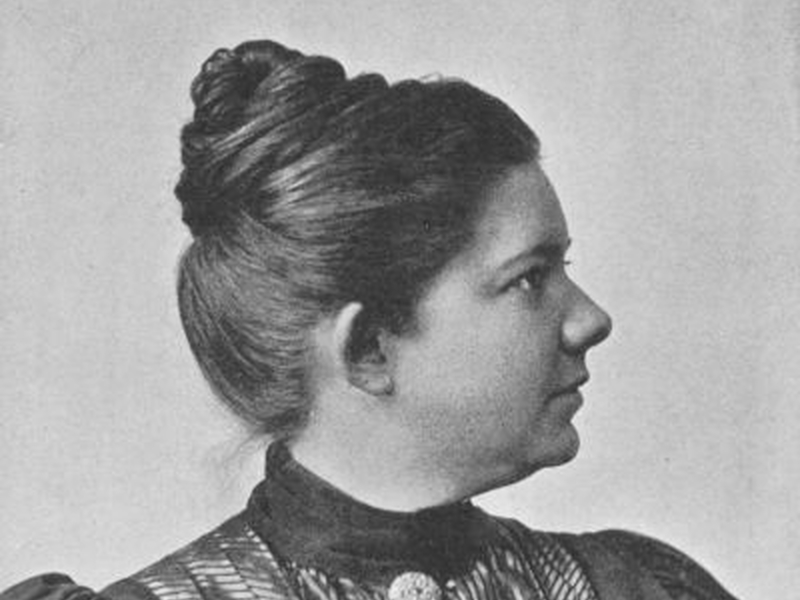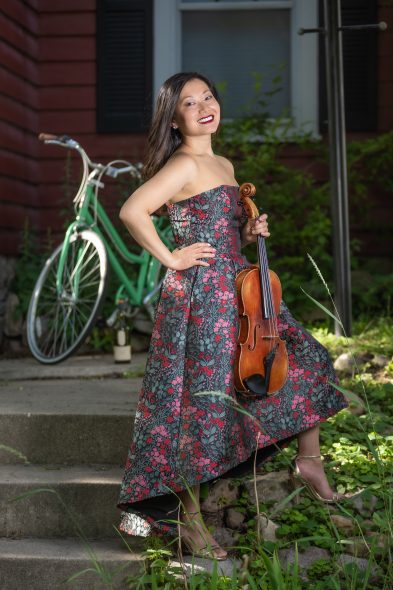Prometheus Trio Performs Amy Beach
American composer's often overlooked piano trio paired with works by Beethoven, Richard Strauss.
The Prometheus Trio closes its 2022-23 season on April 17 with a romantic flourish. Violist Beth Breslin Kiefer will join Prometheus Trio members pianist Stefanie Jacob, violinist Margot Schwartz, and cellist Scott Tisdel. A little performed piano trio by Amy Beach will be accompanied by a dramatic piano quartet by Richard Strauss and a string trio by Ludwig van Beethoven that anticipates the drama of his yet-to-be-written string quartets.
Born in 1867 in New Hampshire, composer Amy Beach was recognized as a child prodigy. Spending most of her life in Boston, access to formal musical education was limited by her sex. Already recognized as a concert pianist, her career was tightly restricted by her husband after she married at age 18. Dr. Beach insisted that his wife restrict her concert appearances to once a year and channel her musical energy into composing. Nonetheless, she was recognized for major breakthrough compositions during that time – including a mass, a symphony, and a piano concerto. She was 43 when her husband died in 1910, leading to a renewed career in the United States and Europe as a pianist, composer, and champion of music education, especially for women. Beach has been identified with the “Second New England School” of composers practicing in Boston, who were among the first to study and compose independently of European models.
Beach wrote her Piano Trio, Op. 150 (1938) late in life. With limited access to composition education, she developed her own style, personally translating French treatises on orchestration by François-Auguste Gevaert and Hector Berlioz. A French sense of melody and color developed at the turn of the 20th century is evident in her work. A more formal opening ends with a finale incorporating an “American” sound into rhythms and melodies. She also incorporates art songs and a setting of an Inuit melody from earlier compositions. Beach resisted trends to reinvent composition in a modern style. Her work is decidedly romantic at a time when this was going out of fashion. For most of us, this approach is back in fashion again.
Beethoven was a confident, well-received pianist as he began composition. His first efforts naturally included the piano. A series of five string trios preceded his acclaimed series of string quartets. His String Trio in D Major, Op. 9, No. 2 (1797-98) is a cheerful work, organized with the same serious style of his quartets. Tisdel observes that “these trios, especially the Op.9s, are much more than mere studies. They are substantial, serious works, surprisingly rich in harmony despite the absence of the fourth string voice. One hears in abundance Beethoven’s characteristic rhythmic vigor, abrupt dynamic changes, subtle manipulations of classical forms, and complex contrapuntal elaborations.”
Although the string trios are well balanced, once he had begun incorporating a second violin for his string quartets, he never looked back. Beethoven left behind a set of string trios that deserve more attention than they get.
Strauss lived in Germany through the Weimar Republic and two world wars. All of that time he was a celebrated composer, conductor, and opera impresario. He continued to write orchestral works until his death at age 85 in 1949. However, all of his chamber compositions were written at a young age.
His Piano Quartet in C Minor, Op. 13 (1884-85) shows influences of Brahms and Schumann. But Jacob comments that “many features of the work are uniquely Straussian: A rather flamboyant virtuosity in all parts, especially the piano; deft handling of modulation and use of distant key areas; and soaring melodies combined with lighter, more capricious material. Finally, Strauss’ life-long love of counterpoint (canons, invertible counterpoint, especially putting the melody in the bass, and augmentation/diminution) is strongly in evidence.”
Schumann’s influence is apparent in the finale of the piano quartet. The piano provides the energy, dense melodies experience twists and turns, and all three strings join the piano in a surging finale that reaches for a symphonic conclusion.
A guest violist allows the Prometheus Trio to explore works not in their usual repertoire. The choices also introduce works not heard often by any group in Milwaukee; a creative piano trio by a rediscovered American composer, a strong entry for chamber strings before Beethoven settled on quartets rather than string trios, and Strauss’s dramatic contribution to the chamber literature by a symphonic composer rarely associated with chamber music.
The Prometheus Trio will perform at 7:00 p.m. next Monday, April 17, at the Wisconsin Conservatory of Music at 1584 N. Prospect Ave. Tickets are available online or at the door. Parking for evening events is available at the Milwaukee Eye Care lot north of the Conservatory at 1684 N. Prospect Ave.
Preview
-
A Sacred Choir, 70 Voices Strong
 Dec 14th, 2025 by Martha Brown
Dec 14th, 2025 by Martha Brown
-
Prometheus Trio Goes Bohemian
 Dec 3rd, 2025 by Martha Brown
Dec 3rd, 2025 by Martha Brown
-
Present Music Offers New Choral Works
 Nov 20th, 2025 by Michael Barndt
Nov 20th, 2025 by Michael Barndt






















